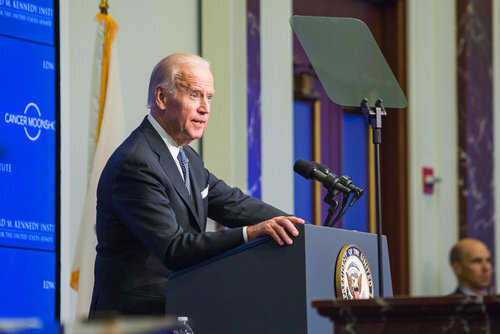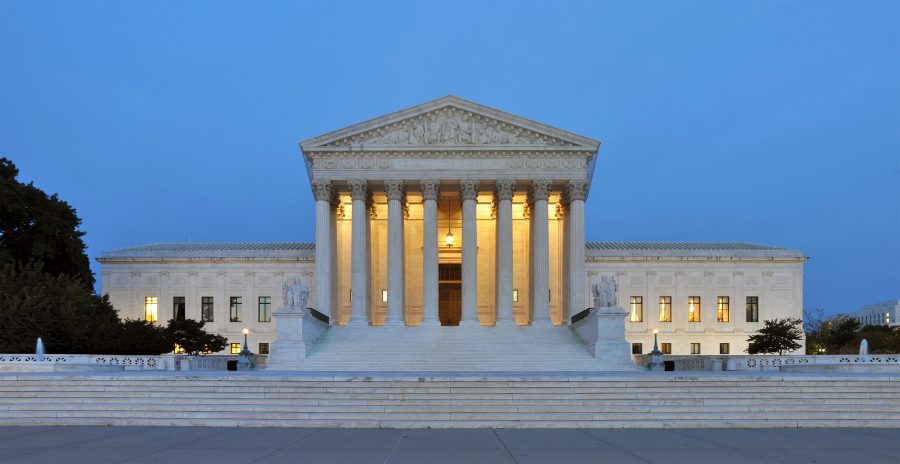Image from Wikimedia.
On Thursday, Jan. 13th, the Supreme Court struck down President Joe Biden’s most recent vaccine mandate that would require employees of companies with over 100 workers to be fully vaccinated or tested weekly. Biden did score a small victory despite this: The Supreme Court accepted a more limited mandate for some healthcare workers that requires workers employed at government funded healthcare facilities to be fully vaccinated. In many major hospitals and other government-funded health care facilities, there has been a vaccine mandate already put in place by the organization itself.
Dr. Lynne Covitz, a psychologist at Children’s Mercy Hospital, said that “public health and economic health are integrated,” and that as vaccination rates and requirements go up, so should business’ success.
On Tuesday, Jan. 25th, according to the Department of Labor, it is withdrawing its vaccine and testing mandate for large U.S. employers after the Supreme Court blocked the rule. The Occupational Health and Safety Administration (OSHA) also said that while it was withdrawing the emergency temporary standard, it would be keeping the mandate as a proposed rule. This emergency temporary standard only lasted three days before the Supreme Court struck it down along with the mandate on large employers.

In an unsigned opinion, the Court said that “although Congress has indisputably given OSHA the power to regulate occupational dangers, it has not given that agency the power to regulate public health more broadly.” They also wrote that “requiring the vaccination of 84 million Americans, selected simply because they work for employers with more than 100 employees, certainly falls in the latter category.”
Without the Labor Department’s mandate in effect, employers are subject to the mandates of the state and local governments. The majority of states are requiring or allowing vaccine mandates for large employers, but according to Becker’s Hospital Review, 12 states, including Texas, Georgia, Arkansas, and Florida, are banning company vaccine mandates.
The Biden administration, along with OSHA and the Labor Department, are still pushing for the full mandate to go through, despite how the Supreme Court recently ruled on the National Federation of Independent Business v. OSHA case. However, the conservative Roberts Court is unlikely to pass the mandate any time soon. The Roberts Court reasoned that OSHA was never given the power by Congress to regulate the lives of 84 million Americans on the workforce that the mandate would affect.
“Congress has nowhere clearly assigned so much power to OSHA,” the court reasoned. Two years have passed since the start of the pandemic, and vaccines have been available for one of those years. “Over that span, Congress has adopted several major pieces of legislation aimed at combating COVID–19. But, Congress has chosen not to afford OSHA—or any federal agency—the authority to issue a vaccine mandate,” the concurring opinion states.
The court also states that while COVID-19 is and has been a major problem in the United States, it does not call for the amount of power that would be given to OSHA to mandate nationwide vaccines.
The opinion also cited the 1819 landmark case of McCulloch v. Maryland for separation of powers. It said that “not only must the federal government properly invoke a constitutionally enumerated source of authority to regulate in this area or any other, it must also act consistently with the Constitution’s separation of powers.” The Court wants Congress to be more specific in their language going forward, and according to the Supreme Court, the main problem in this case arose from OSHA’s misinterpretation of Congress’s mandate.

The dissenting opinion argued that what OSHA did was completely in the scope of Congress’s mandate . The opinion stated that OSHA “did what Congress commanded it (OSHA) to: It took action to address COVID–19’s continuing threat in those [work] spaces.” It also argues that workers have little control over their workplace environment once they are employed, so therefore they should feel safe in the place in which they work. The dissenting opinion states that the ruling will cause “grave danger to the nation’s workforce.”
What does this mean for small businesses and locally owned companies? Some small businesses might already have their own vaccine mandate, but the Biden administration’s proposal will push some smaller businesses to start requiring vaccines, and might even cause some to push back against Biden and stop requiring vaccines.
Whether or not the full vaccine mandate should or will be approved, the fact remains that the workforce is in jeopardy regardless of the mandate. Employees will quit if the full mandate is in effect, and employees will quit if it is not. There is no clear answer on how to combat the virus while preserving the workforce, so the only thing to do now is attempt to deal with the fallout of this decision.










































































